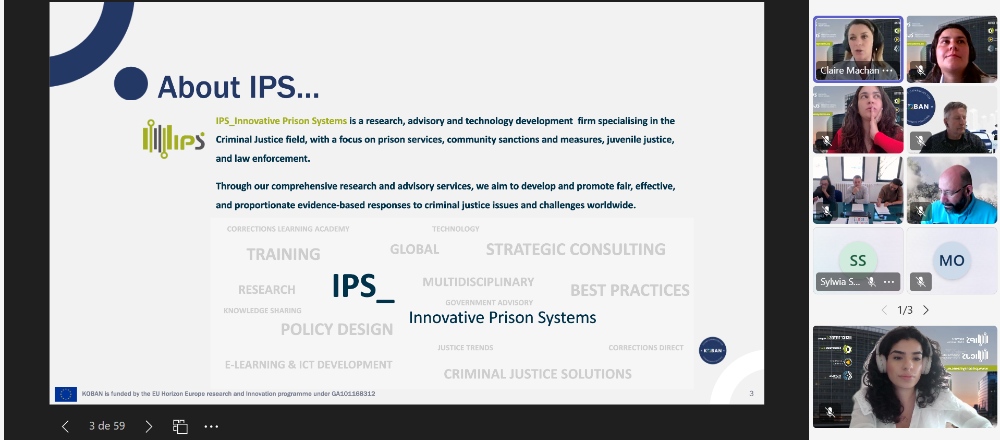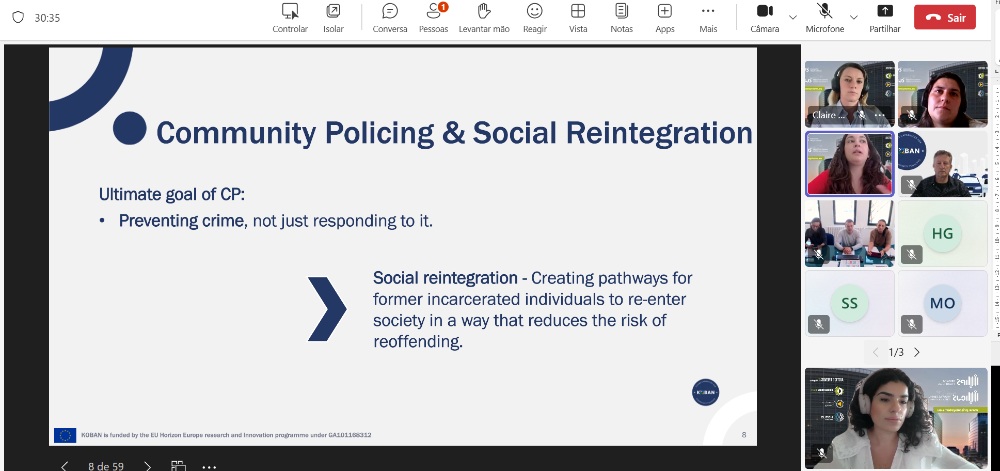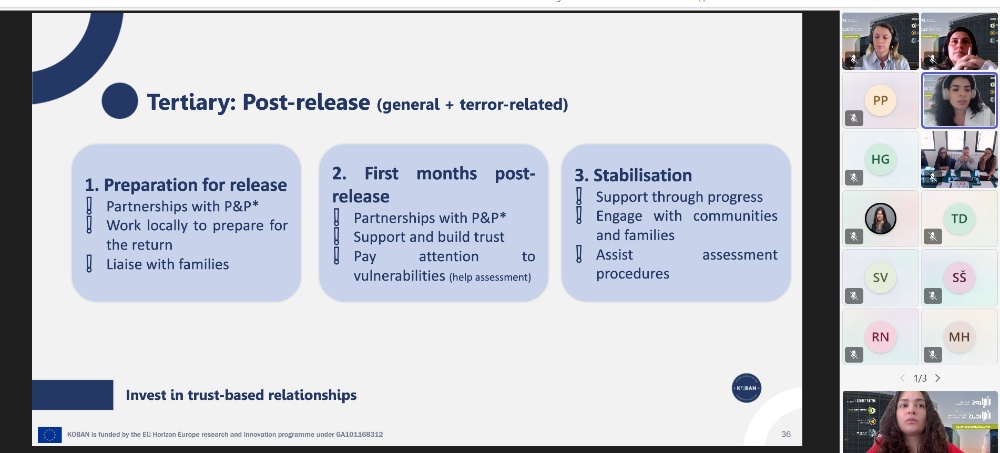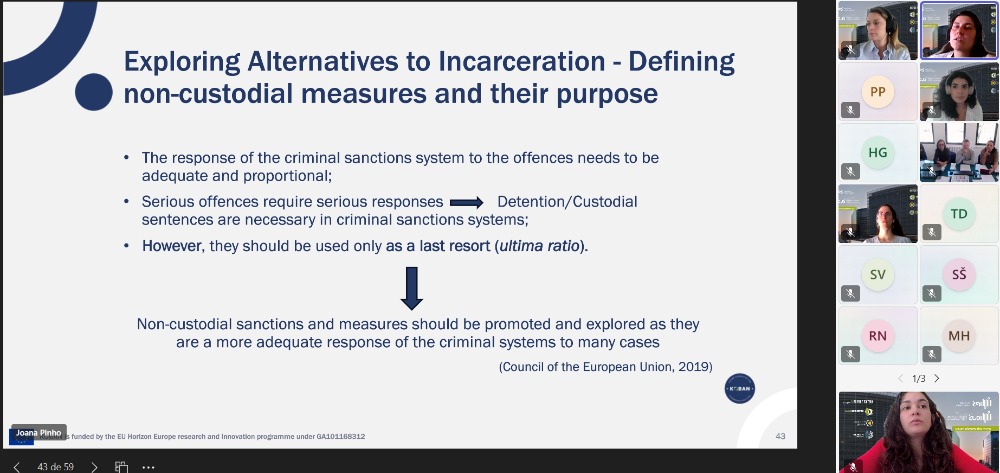Experts from law enforcement, the criminal justice system, and the research sector came together for an awareness event on Community Policing and Rehabilitative Justice, organised by IPS_Innovative Prison Systems in partnership with the Netherlands Police - NPN. The discussions centered on new and effective strategies for preventing crime and building safer communities.
Community policing plays a crucial role in fostering trust, preventing crime, and creating safer communities. By actively engaging with local organisations, social workers, and justice professionals, law enforcement can move beyond reactive responses to crime and adopt a proactive, collaborative approach. This partnership enables law enforcement to gain a deeper understanding of the root causes of crime, allowing them to create tailored, community-driven solutions that not only prevent crime but also foster long-term social stability and resilience.
Organised by IPS in partnership with the Netherlands Police (NPN), the awareness-raising event “From Primary to Tertiary Prevention through Community Policing: Reflections on a Criminal Justice Rehabilitative-Oriented Approach” brought together 34 experts and professionals. The event centred on innovative strategies to enhance crime prevention, build community resilience, and promote sustainable alternatives to incarceration, underscoring the essential role of collaboration between law enforcement agencies (LEAs) and communities in creating effective reintegration pathways and enhancing public safety.
Holistic Radicalisation Prevention Initiative
Reimagining policing: Building trust, resilience, and pathways to reintegration
Discussions highlighted the growing need to position the police not just as enforcers of the law, but as active connectors within their communities – particularly in helping former sentenced individuals reintegrate successfully into society. The importance of building public safety through inclusive, community-based initiatives that foster trust, and collaboration was a central point, with a strong focus on locally driven prevention strategies to enhance community resilience in the face of radicalisation and extremist influences. Participants also emphasised the need for coordinated, multi-agency efforts to improve the effectiveness of non-custodial sentences, as well as to support a broader shift towards restorative justice.
Holistic Radicalisation Prevention Initiative




Experts from IPS contributed with insights from their respective fields, helping to deepen the discussion on addressing the root causes of criminal behaviour, promoting social cohesion, and aligning justice practices with international human rights standards. Representing IPS were Inês de Castro, Head of Unit for Risk Prevention and Criminogenic Intervention within the Rehabilitation, Reintegration, and Community Portfolio; Margarida Damas, Head of Unit for Communitarian Inclusion and Social Development within the Radicalisation, Violent Extremism and Organised Crime Portfolio; and Joana Pinho, Coordinator of the International Judicial Cooperation & Human Rights Portfolio. The session was moderated by Claire Machan, Coordinator of the Rehabilitation, Reintegration, and Community Portfolio at IPS, with co-moderation by Patrick Padding from the National Police of the Netherlands (NPN).
Holistic Radicalisation Prevention Initiative
The KOBAN initiative
This event was part of the IPS-partnered initiative KOBAN (Identifying Future Capabilities for Community Policing) a European project aimed at driving cultural and organisational transformation within law enforcement. By tackling systemic challenges and empowering LEAs with forward-thinking tools and practices, KOBAN supports the evolution of stronger, more resilient, and community-focused policing across Europe.
IPS is proud of its collaboration with NPN in bringing together a diverse group of experts and partners to advance these important discussions. By building strong partnerships across sectors, we ensure that interventions are not only effective but also inclusive, fostering long-term solutions that promote community resilience and support the reintegration of offenders into society.
Holistic Radicalisation Prevention Initiative
Know more about this project

KOBAN
Identifying future capabilities for Community Policing
KOBAN is led by the National Police of the Netherlands.
The remaining consortium members of the KOBAN project are IPS_Innovative Prison Systems (Portugal), the Polish Platform for Homeland Security – PPHS (Poland), the Sheffield Hallam University – CENTRIC (UK) Netherlands Organisation for Applied Scientific Research – TNO (The Netherlands), SAHER Europe (Estonia), VicomTech (Spain), TIMELEX (Belgium), the Finnish Police – FIMOI (Finland), Valencia Local Police – PLV (Spain), Home Office of the United Kingdom (UK), Erasmus University (The Netherlands), the European Forum for Urban Security (EFUS), City Brussels Police (Belgium), Ianus Consulting Ltd (Cyprus), the Centre for Research & Technology Hellas – CERTH (Greece), Polish Police Regional HQ in Radom – KWPR (Poland), Lisbon Municipal Police (Portugal) and the Czech Police (Czechia).
For more information on the project, or to learn how to get involved, please visit its website.
Related projects

WAYOUT
Integrated Exit Programme for Prisons and Probation

VicTory
Restorative and victim-centred approach to mitigate hate and (violent) extremism

SHIELDed
Safeguarding symbolic places of personal and religious development and freedom in Europe through a multi-stakeholder approach.

SafeBorders
Strengthening Judicial expertise and Frontline support to combat Child Trafficking

REFUGIN
Communitarian approach for a holistic young refugee long-term integration

R4JUST
Radicalisation Prevention Competences’ Development Programme for Justice Professionals

R2PRIS
Radicalisation Prevention in Prisons

R2COM
Radicalisation and violent extremism prevention in the community

PRACTICIES
Partnership against Radicalisation in Cities

PARTES
Participatory Approaches to Protecting Places of Worship

MIRAD
Multi-Ideological Radicalisation Assessment towards Disengagement

KOBAN
Identifying future capabilities for Community Policing
Related news

JUSTICE TRENDS Magazine Launches 14th Edition: Expanding the Frontiers of Rehabilitation Support
Read More »
IPS’ CEO joins leading experts at event organised by INTERPOL to discuss the future of offender management
Read More »






